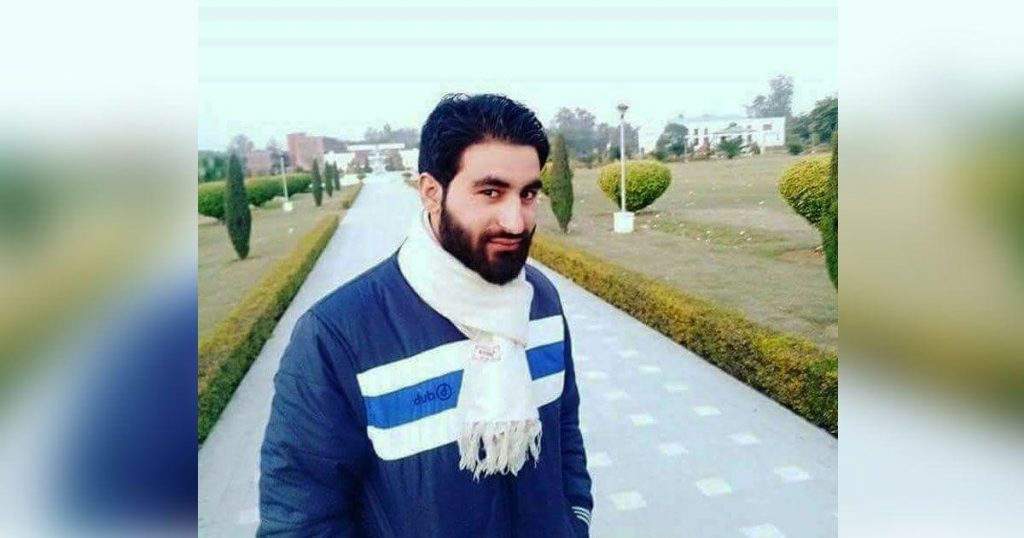
“Till the path of martyrs is walked, no corrupt narrative will find its space in Kashmir. The day the gun is silent, their deceit will succeed. Our cause is crystal clear and let nobody feel confused about it. India has to go!”
-Shaheed Mannan Wani
2010 in Kashmir was a year marked with a vigorous upsurge. The youth having witnessed their paradise ripped apart with bloodbath for the last two years in particular with dismay, went off into the forests in large numbers and soon became India’s biggest and most relentless rebuttal. Fearless to the bone, equipped with a blazing yen for freedom, inspired by the Hurriyat ideas of Syed Ali Geelani, the face of this armed struggle was undoubtedly a young boy in his 20’s, the famous Burhan Wani. Now known as the Master Martyr among his followers, the example of Burhan Wani kindled hope for militancy as the only solution in the young hearts. Mannan Wani is one of these spirited and empowered hearts, martyred in 2018 on this date, but not before having had his name etched into the heart of the enemy in fiery letters.
Born and raised in hills among the military, the young Wani in his early years held notions not unlike an Indian. As his world grew further, he became cognizant of the variety of discourses. His intellectual synthesis took form when he started PhD studies at Aligarh University. He became well-versed in the realities of the emerging fascist India under BJP’s modus operandi. His political activism was marked with the awareness that freedom is inevitable for Kashmir and it became his ‘Gospel truth’. It was in 2016 that he put down his pen and picked up the gun, formally becoming part of the Jammu Kashmir Hizbul Mujahideen.
Arguing with those supposed wise minds in the upper echelons who believed that ‘abandon all hope ye who enter here’, and that a dignified exit from the conflict should be sought, he proclaimed that there can be no dignified exit when the basis of a conversation is not equality but colonial dominance. India had the valley soaked in blood as ‘consequence of politics of imposition, deceit and manipulation’, the occupier could now only be met with a rifle in the hand.
He derided the alleged intellectuals who had collaborated with the colonizer as sell-outs and weak disengaged products of a fraudulent democracy and waved his AK-47 in their faces as the one and only choice. Inspired by the great Malcolm X, he has repeatedly quoted his words,
“Be peaceful, be courteous, obey the law, respect everyone; but if someone puts his hand on you, send him to the cemetery.”
His open letters are eye-opening, rife with staggering intellect and a percipient assessment of the Kashmir issue. He delineates the struggle of his courageous fellow men right from the beginning with shrewdness of Iqbal’s shaheen and makes an unwavering case for armed struggle as the best hope for freedom from the tyrannical Indian occupation. The optimist in him reflected on USSR’s overthrowal by the meager Afghan numbers.
“When the occupier is uncivilized … and it thinks through the barrel of gun, the response cannot be a surrender in the guise of ‘peace talks’. It has to be a maneuver to crush her arrogance.”
His famous declaration states that when the occupation is ugly, the resistance can neither be beautiful nor can its means be dictated by the oppressor. The cancer of occupation can only be eradicated when the young generation apprises itself of the new military, mental and diplomatic tactics of the colonizer. The onslaught of Indian narratives and meta narratives, including Kashmiriyat, sports activism and autonomy, has repeatedly failed which in his opinion is a writing on the wall for the enemy, a clear plebiscite if nothing else. He saw Indian barracks and heavily infested streets of the valley with Indian army as a sign that India is buckled up with frustration. India’s ‘million troopers and a budget of billions to fight a bunch of militants’ speak volumes of the fear that it feels in the face of resilient Kashmiris.
“Limited war is not to be taken as our weakness, it is to offer a scope for the wise.”
Mannan Wani rooted the Kashmiri freedom struggle in the Islamic principles as Islam and slavery can never go hand in hand. The armed struggle is the Kashmiri’s choice for living a dignified life, to fight is to be intelligent and to fight is strength. For his readers across the globe he alluded that the right to pick up the gun is justified for seeking the right to self-determination as per UN resolutions.
He took pride in the fact that people from all across the land especially students from schools, colleges and universities supported their aims. The goal in his mind was to turn India restless- by pen, by voice, by barrel of the gun.
To those who knew him, Mannan Wani was a personification of Iqbal’s verses:
ہو حلقۂ یاراں تو بریشم کی طرح نرم
رزمِ حق و باطل ہو تو فولاد ہے مومن






